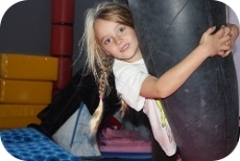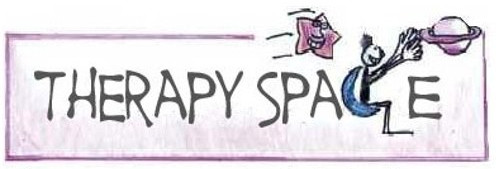Therapy Space Bristol aims to help families by working closely with parent and child together. The children we see are 12 and under who are usually struggling to manage at home and/or school. We aim to educate the family to understand their child’s behaviour from a sensory perspective rather than a behavioural one. Many of the children we are working with will have suffered significant trauma at some point in their lives whether from attachment wounds or from a difficulty processing sensory information. It is fascinating to unravel their problems as every child is different and unique and it is our pleasure to help you understand your child and to help them to be happy.
We have two clinics based in South Bristol – The Planet Room and Rainbow Room, they are a bit like a mini “Total Wipeout” where you can have fun on the different types of swings, hammocks, a giant tyre, the crash pad, mini trampoline, giant balls, cosy den and loads of toys. We also have two smaller rooms for quieter calmer activities such as drawing, knex, messy play and much more. Usually you will find something that suits your personality, whether a child or adult.

Therapy Space provides holistic Occupational Therapy consultations for children with a range of needs. We are a team of experienced independent Occupational Therapists, all having undertaken post qualification training in sensory attachment integration.
Therapy Space specialises in working with children who have sensory processing Disorder and / or relationship / attachment needs.
Occupational Therapists specialize in assisting people with everyday activities (occupations) that make life meaningful and productive. OTs working with children work specifically to improve daily life tasks such as sleeping, eating, learning, playing, relating and developing as well as complex activities needed for academic success. OT addresses both behavioural, physical and cognitive abilities as well as psychological functioning and the child’s context.
Definition by Dr Lucy Miller OTR from her book “Sensational Children”.
Many children will come to Therapy Space without diagnoses because they are struggling due to these different types of difficulties both at home and in school.
Handwriting
Co-ordination
Fine Motor Skills
Organisation
Listening
Attention
Behaviour
Communication
One in ten children struggle with these typical problems.
• Dyspraxia, also known as DCD (developmental co-ordination disorder), is a disability that affects movement and co-ordination.
• Autism is a lifelong spectrum condition which affects how a person communicates and interacts with the world. Many individuals on the autism spectrum have sensory differences and will also experience heightened anxiety. An understanding of an autistic person’s individual strengths and challenges is key in working towards the correct specific support needs being implemented.
• Attachment Difficulties arises from difficulties in forming effective attachments to primary caregivers in early childhood. We work with families who have adopted children.
• Sensory Processing Disorder (SPD) / Sensory Modulation Disorder (SMD) are neurological conditions causing difficulties with taking in, processing and responding to sensory information about the environment and from within the own body.
• Attention Deficit Hyperactivity Disorder (ADHD) is a group of behavioural symptoms that include inattentiveness, hyperactivity and impulsiveness. Attention Deficit Disorder (ADD) is a type of ADHD. Please note we are unable to offer ADHD diagnosis.
We specialise in sensory attachment intervention consultations and therapy. Therapists who work with trauma related cases have had extra specific training in attachment and trauma and are specialists in their area of work.
